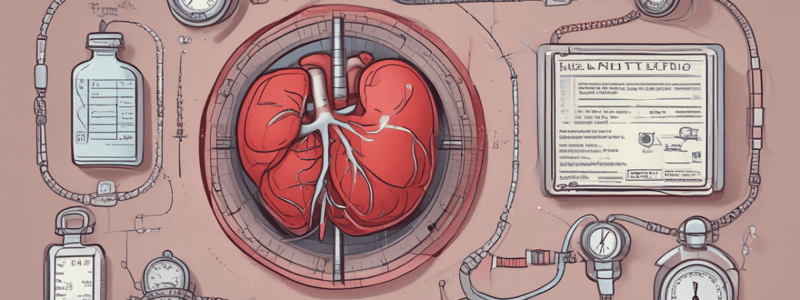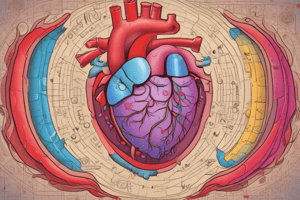Podcast
Questions and Answers
What is the primary consideration for drug therapy in hypertension treatment?
What is the primary consideration for drug therapy in hypertension treatment?
Individualization
What is the primary function of the parasympathetic nervous system (PNS) in the autonomic nervous system?
What is the primary function of the parasympathetic nervous system (PNS) in the autonomic nervous system?
Stimulation of smooth muscles, cardiac muscles, and glands
Which neurotransmitter is responsible for stimulating the heart, blood vessels, and skeletal muscles in the autonomic nervous system?
Which neurotransmitter is responsible for stimulating the heart, blood vessels, and skeletal muscles in the autonomic nervous system?
Norepinephrine
What is the primary mechanism of action of alpha2 receptor agonists in the treatment of hypertension?
What is the primary mechanism of action of alpha2 receptor agonists in the treatment of hypertension?
What is the effect of ARBs on vasoconstriction and aldosterone secretion?
What is the effect of ARBs on vasoconstriction and aldosterone secretion?
What is the primary effect of blocking alpha1-adrenergic receptors in the treatment of hypertension?
What is the primary effect of blocking alpha1-adrenergic receptors in the treatment of hypertension?
How do ACE inhibitors and ARBs compare in terms of effectiveness and tolerability in treating hypertension?
How do ACE inhibitors and ARBs compare in terms of effectiveness and tolerability in treating hypertension?
What is the role of the angiotensin-converting enzyme (ACE) in the renin-angiotensin-aldosterone system?
What is the role of the angiotensin-converting enzyme (ACE) in the renin-angiotensin-aldosterone system?
What is the cardioprotective effect of ARBs compared to ACE inhibitors?
What is the cardioprotective effect of ARBs compared to ACE inhibitors?
What is the primary effect of direct renin inhibitors on the renin-angiotensin-aldosterone system?
What is the primary effect of direct renin inhibitors on the renin-angiotensin-aldosterone system?
What are the common adverse effects of ARBs?
What are the common adverse effects of ARBs?
What is the primary mechanism of action of calcium channel blockers (CCBs) in the treatment of hypertension?
What is the primary mechanism of action of calcium channel blockers (CCBs) in the treatment of hypertension?
How do ARBs affect the autonomic nervous system?
How do ARBs affect the autonomic nervous system?
What is the role of ARBs in the management of heart failure?
What is the role of ARBs in the management of heart failure?
How do ARBs affect blood pressure regulation?
How do ARBs affect blood pressure regulation?
What is the relationship between ARBs and cardiovascular disease risk?
What is the relationship between ARBs and cardiovascular disease risk?
What is the primary effect of alpha1 blockers on the urinary system?
What is the primary effect of alpha1 blockers on the urinary system?
How do beta blockers like propranolol, metoprolol, and atenolol reduce blood pressure?
How do beta blockers like propranolol, metoprolol, and atenolol reduce blood pressure?
What is the dual effect of dual-action alpha1 and beta receptor blockers like labetalol and carvedilol?
What is the dual effect of dual-action alpha1 and beta receptor blockers like labetalol and carvedilol?
What is a common contraindication for the use of adrenergic drugs?
What is a common contraindication for the use of adrenergic drugs?
What is a common adverse effect of adrenergic drugs?
What is a common adverse effect of adrenergic drugs?
What is a potential interaction between adrenergic drugs and other medications?
What is a potential interaction between adrenergic drugs and other medications?
What is a key assessment the nurse should make when administering an alpha-adrenergic drug for hypertension?
What is a key assessment the nurse should make when administering an alpha-adrenergic drug for hypertension?
What is the primary indication for the use of adrenergic drugs?
What is the primary indication for the use of adrenergic drugs?
According to the JNC-8, what is the systolic blood pressure value that warrants therapy initiation for patients 60 years or older?
According to the JNC-8, what is the systolic blood pressure value that warrants therapy initiation for patients 60 years or older?
What is the formula for blood pressure (BP)?
What is the formula for blood pressure (BP)?
What percentage of hypertension cases are classified as essential (primary) hypertension?
What percentage of hypertension cases are classified as essential (primary) hypertension?
What is the estimated number of people affected by hypertension in the United States?
What is the estimated number of people affected by hypertension in the United States?
According to the JNC-8, what is the diastolic blood pressure value that warrants therapy initiation for patients younger than 60 years?
According to the JNC-8, what is the diastolic blood pressure value that warrants therapy initiation for patients younger than 60 years?
What is the major risk factor for coronary artery disease (CAD) and cardiovascular disease (CVD)?
What is the major risk factor for coronary artery disease (CAD) and cardiovascular disease (CVD)?
What is the term for hypertension with a known cause?
What is the term for hypertension with a known cause?
What is the physiological determinant of blood pressure that contributes to hypertension?
What is the physiological determinant of blood pressure that contributes to hypertension?
What is the primary mechanism of action of doxazosin in reducing blood pressure?
What is the primary mechanism of action of doxazosin in reducing blood pressure?
What is the benefit of nebivolol compared to other beta blockers in terms of sexual dysfunction?
What is the benefit of nebivolol compared to other beta blockers in terms of sexual dysfunction?
What is the mechanism of action of ACE inhibitors in reducing blood pressure?
What is the mechanism of action of ACE inhibitors in reducing blood pressure?
What is the primary indication for the use of carvedilol?
What is the primary indication for the use of carvedilol?
What is the contraindication for the use of carvedilol in patients with bronchospastic conditions?
What is the contraindication for the use of carvedilol in patients with bronchospastic conditions?
What is the importance of tapering nebivolol when discontinuing its use?
What is the importance of tapering nebivolol when discontinuing its use?
What is the role of ACE inhibitors in the treatment of heart failure?
What is the role of ACE inhibitors in the treatment of heart failure?
What is the effect of ACE inhibitors on the renin-angiotensin-aldosterone system?
What is the effect of ACE inhibitors on the renin-angiotensin-aldosterone system?
Study Notes
Pharmacology Overview
- Drug therapy for hypertension must be individualized.
- Seven main categories of drugs to treat hypertension:
- Diuretics
- Adrenergic drugs
- Vasodilators
- Angiotensin-converting enzyme (ACE) inhibitors
- Angiotensin II receptor blockers (ARBs)
- Calcium channel blockers (CCBs)
- Direct renin inhibitors
Review of Autonomic Neurotransmission
- Two divisions of the autonomic nervous system (ANS):
- Parasympathetic nervous system (PNS): stimulates smooth muscles, cardiac muscles, and glands
- Sympathetic nervous system (SNS): stimulates the heart, blood vessels, and skeletal muscles
- Stimulation is controlled by neurotransmitters:
- Acetylcholine
- Norepinephrine
- Receptors are located throughout the body
Adrenergic Drugs
- Five subcategories:
- Adrenergic neuron blockers (central and peripheral)
- Alpha2 receptor agonists (central)
- Alpha1 receptor blockers (peripheral)
- Beta receptor blockers (peripheral)
- Combination alpha1 and beta receptor blockers (peripheral)
Centrally Acting Adrenergic Drugs
- Clonidine and methyldopa:
- Stimulate alpha2-adrenergic receptors in the brain
- Decrease sympathetic outflow from the central nervous system
- Decrease norepinephrine production
- Stimulate alpha2-adrenergic receptors, resulting in decreased renin activity in the kidneys
- Result in decreased BP
Peripherally Acting Alpha1 Blockers
- Doxazosin, prazosin, and terazosin:
- Block alpha1-adrenergic receptors
- Decrease BP
- Dilate arteries and veins
- Increase urinary flow rates and decrease outflow obstruction by preventing smooth muscle contractions in the bladder neck and urethra
- Used to treat benign prostatic hyperplasia (BPH)
Beta Blockers
- Propranolol, metoprolol, and atenolol:
- Reduce heart rate through beta1 receptor blockade
- Cause reduced secretion of renin
- Long-term use causes reduced peripheral vascular resistance
Dual-Action Alpha1 and Beta Receptor Blockers
- Labetalol and carvedilol:
- Dual antihypertensive effects of reduction in heart rate (beta1 receptor blockade) and vasodilation (alpha1 receptor blockade)
Adrenergic Drugs: Indications/Contraindications
- Indications:
- Hypertension
- Glaucoma
- BPH
- Management of severe heart failure (HF) when used with cardiac glycosides and diuretics
- Contraindications:
- Acute HF
- MOAIs
- Peptic ulcers
- Severe liver/kidney disease
- Asthma (with beta blockers)
Adrenergic Drugs: Adverse Effects
- High incidence of orthostatic hypotension
- First-dose syncope
- Most common:
- Bradycardia with reflex tachycardia
- Dry mouth
- Drowsiness, sedation
- Constipation
- Depression
- Edema
- Sexual dysfunction
- Other:
- Headaches
- Sleep disturbances
- Nausea
- Rash
- Rebound hypertension with abrupt discontinuation
Adrenergic Drugs: Interactions
- Can cause additive CNS depression with alcohol, benzodiazepines, opioids
- Always check for specific drug interactions
ACE Inhibitors and Angiotensin II Receptor Blockers
- ACE inhibitors and ARBs are equally effective for the treatment of hypertension
- Both are well tolerated
- ARBs do not cause cough
- Evidence that ARBs are better tolerated and are associated with lower mortality after MI than ACE inhibitors
- Not yet clear whether ARBs are as effective as ACE inhibitors in treating HF (cardioprotective effects) or in protecting the kidneys, as in diabetes
Angiotensin II Receptor Blockers: Indications
- Hypertension
- Adjunctive drugs for the treatment of HF
- May be used alone or with other drugs such as diuretics
Angiotensin II Receptor Blockers: Adverse Effects
- Most common adverse effects:
- Chest pain
- Fatigue
- Hypoglycemia
- Diarrhea
- Urinary tract infection
- Anemia
- Weakness
- Hyperkalemia and cough are less likely to occur than with ACE inhibitors
Hypertension Defined (JNC-8)
- 60 years or older: systolic blood pressure (SBP) greater than 150 mm Hg or diastolic blood pressure (DBP) greater than 90 mm Hg
- Younger than 60 years and those who have chronic kidney disease or diabetes: SBP greater than 140 mm Hg and DBP greater than 90 mm Hg
Blood Pressure
- Blood pressure (BP) = CO × SVR
- CO = cardiac output
- SVR = systemic vascular resistance
- Hypertension = high BP
- Hypertension is a major risk factor for coronary artery disease (CAD) and cardiovascular disease (CVD)
Classification of Blood Pressure
- Hypertension can also be defined by its cause:
- Unknown cause: essential, idiopathic, or primary hypertension (90% of cases)
- Known cause: secondary hypertension (10% of cases)
Doxazosin (Cardura)
- Commonly used alpha1 blocker
- Reduces peripheral vascular resistance and BP by dilating both arterial and venous blood vessels
Dual-Action Alpha1 and Beta Receptor Blockers
- Carvedilol (Coreg):
- Widely used drug that is well tolerated
- Uses: hypertension, mild to moderate HF in conjunction with digoxin, diuretics, and ACE inhibitors
- Contraindications: known drug allergy, cardiogenic shock, severe bradycardia or HF, bronchospastic conditions such as asthma, and various cardiac problems involving the conduction system
Beta Receptor Blocker
- Nebivolol (Bystolic):
- Uses: hypertension and HF
- Action: blocks beta1 receptors and produces vasodilatation, resulting in a decrease in SVR
- Less sexual dysfunction
- Do not stop abruptly; must be tapered over 1 to 2 weeks
Angiotensin-Converting Enzyme (ACE) Inhibitors
- Large group of safe and effective drugs:
- Currently, there are 10 ACE inhibitors
- Often used as first-line drugs for HF and hypertension
- May be combined with a thiazide diuretic or CCB
ACE Inhibitors: Mechanism of Action
- Inhibit ACE
- ACE: converts angiotensin I (AI) to angiotensin II (AII)
- AII: potent vasoconstrictors that induce aldosterone secretion by the adrenal glands
- Aldosterone: stimulates sodium and water resorption, which can raise BP
- Renin-angiotensin-aldosterone system
- ACE inhibitors thus lower BP
Studying That Suits You
Use AI to generate personalized quizzes and flashcards to suit your learning preferences.
Related Documents
Description
Learn about the individualized approach to drug therapy for hypertension, including the seven main categories of drugs used to treat it. Test your knowledge of pharmacology and hypertension treatment!



